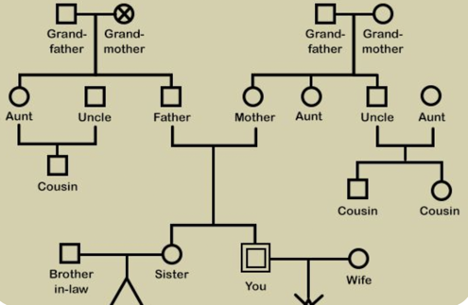Have you ever looked at a person and thought, “How did this person come to be?” Where did they acquire these traits, personality, way of viewing the world, etc.? Most of us have heard the age-old argument of “Nature vs. Nurture.” Which is more important? The truth is both are extremely influential and important in the case of human development.
People become who they are largely based on how their family shaped them. Think about your own family now. I want you to even think about your family tree. What do you know about your grandparents and what they went through? The image below is a Genogram. I often create these in session with my clients.
Everything can be charted on a Genogram to have a map of a person’s family, such as death, divorce, abandonment, mental illness, alcoholism, you name it. Once everything is charted and you get to look at the map of your life, it can be eye-opening. What patterns do you see? What has bled through the generations? Most people find a mix of negative and positive traits that have trickled down over the years. Now you get to decide what you want to trickle down and what kind of “generational curses” you don’t want to pass onto the generations that follow you.
Family Therapy can provide a wide array of benefits such as:
Increased understanding: Family therapy helps individuals understand their family members' perspectives, feelings, and experiences, leading to a deeper level of understanding and empathy.
Improved communication: Family therapy provides a safe and structured environment for family members to communicate with one another and learn better communication skills.
Strengthened family bonds: By working through challenges together and learning new ways of interacting with one another, family therapy can help strengthen the bonds between family members.
Increased coping skills: Family therapy can provide individuals and families with the skills needed to better cope with stress, anxiety, and other mental health issues.
Reduced conflict: Family therapy helps family members resolve conflicts in a positive and constructive way, reducing the frequency and intensity of future conflicts.
What does family therapy look like? It is natural to picture an entire family attending therapy together, but that is not always the case. It may also look like a father and child, mother and child, siblings, or an individual seeking to better understand their family members’ perspectives.
Overall, family therapy can help individuals and families to improve their relationships, increase their sense of well-being, and find solutions to the challenges they face. If you feel you or your family may benefit from therapy, we believe there is hope and we are here to help. You may call to set up an appointment or self-book at a time that works for you. I am excited to work with you and your family.
Author
Sarah Daniel, MACC, LMFT-A
Supervised by R. Bartee, PhD, LPC-S, LMFT-S



